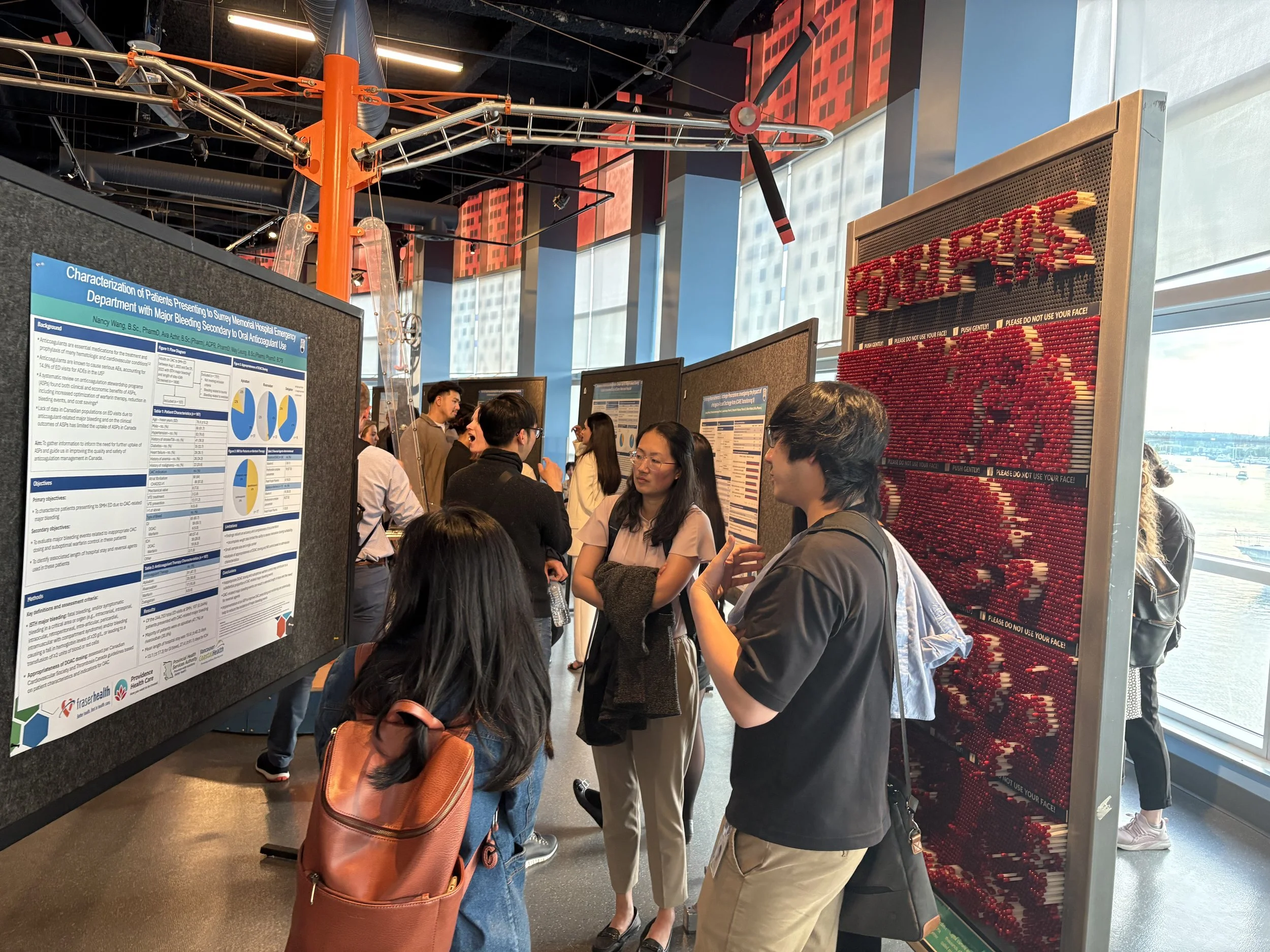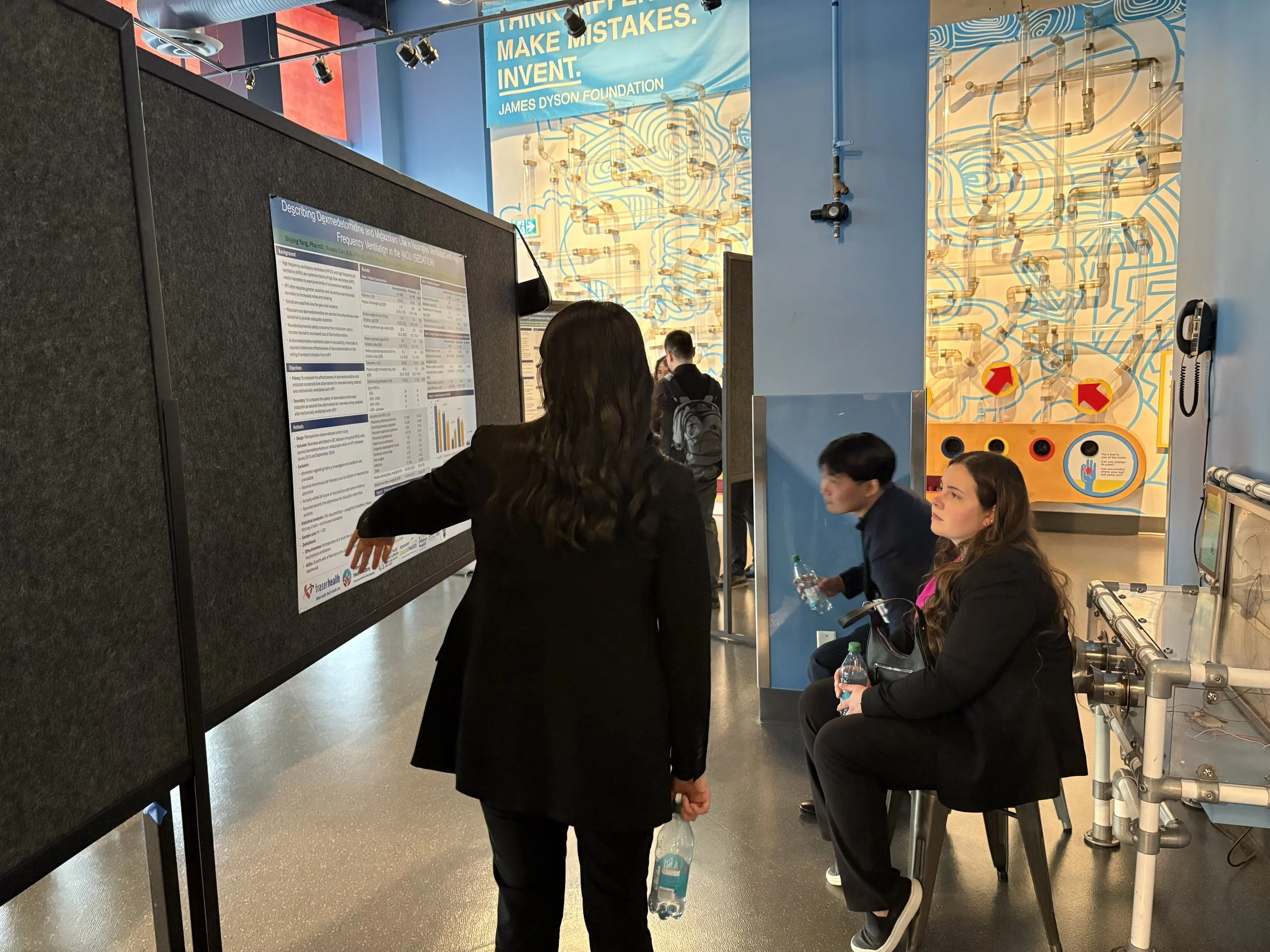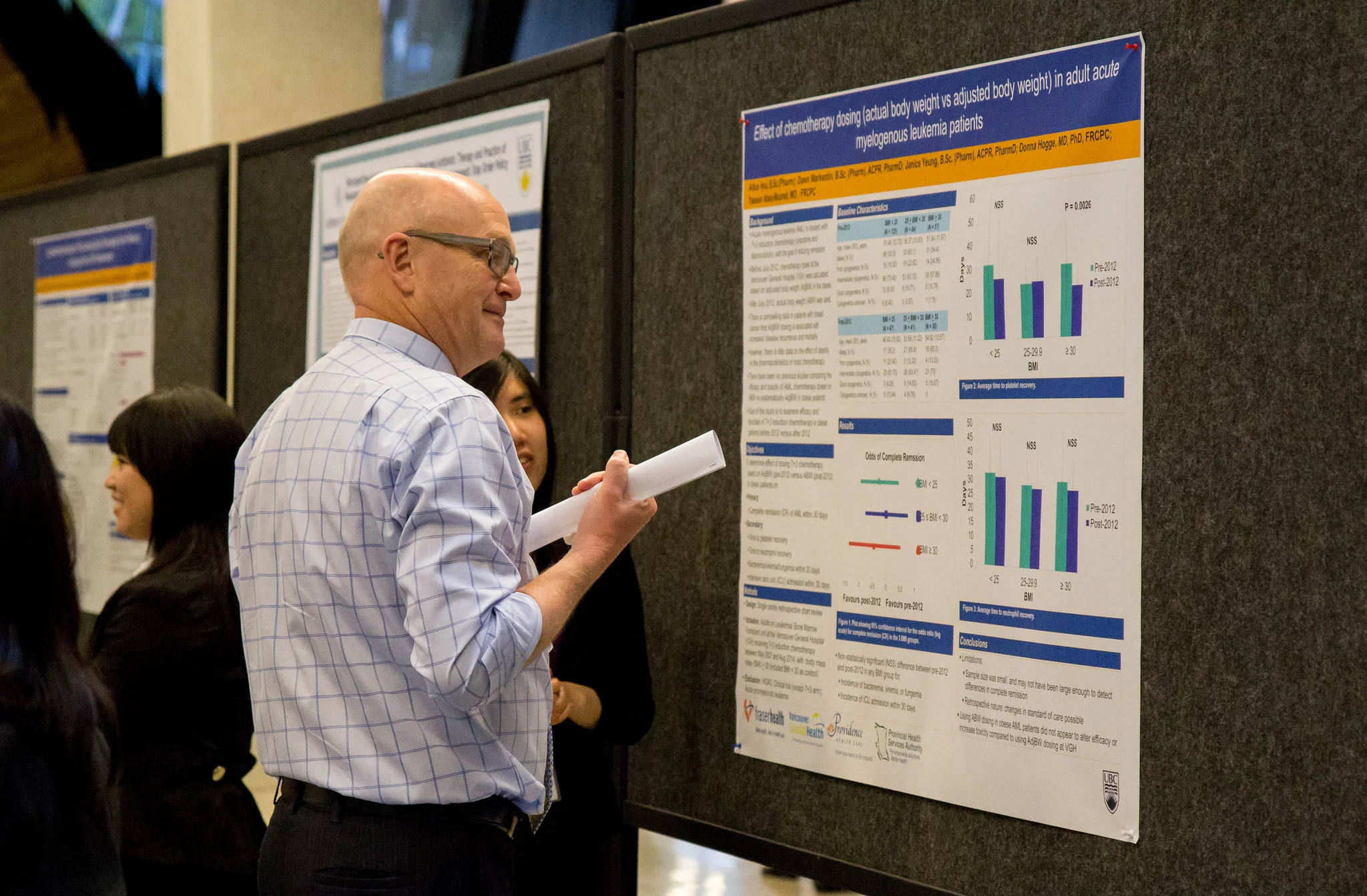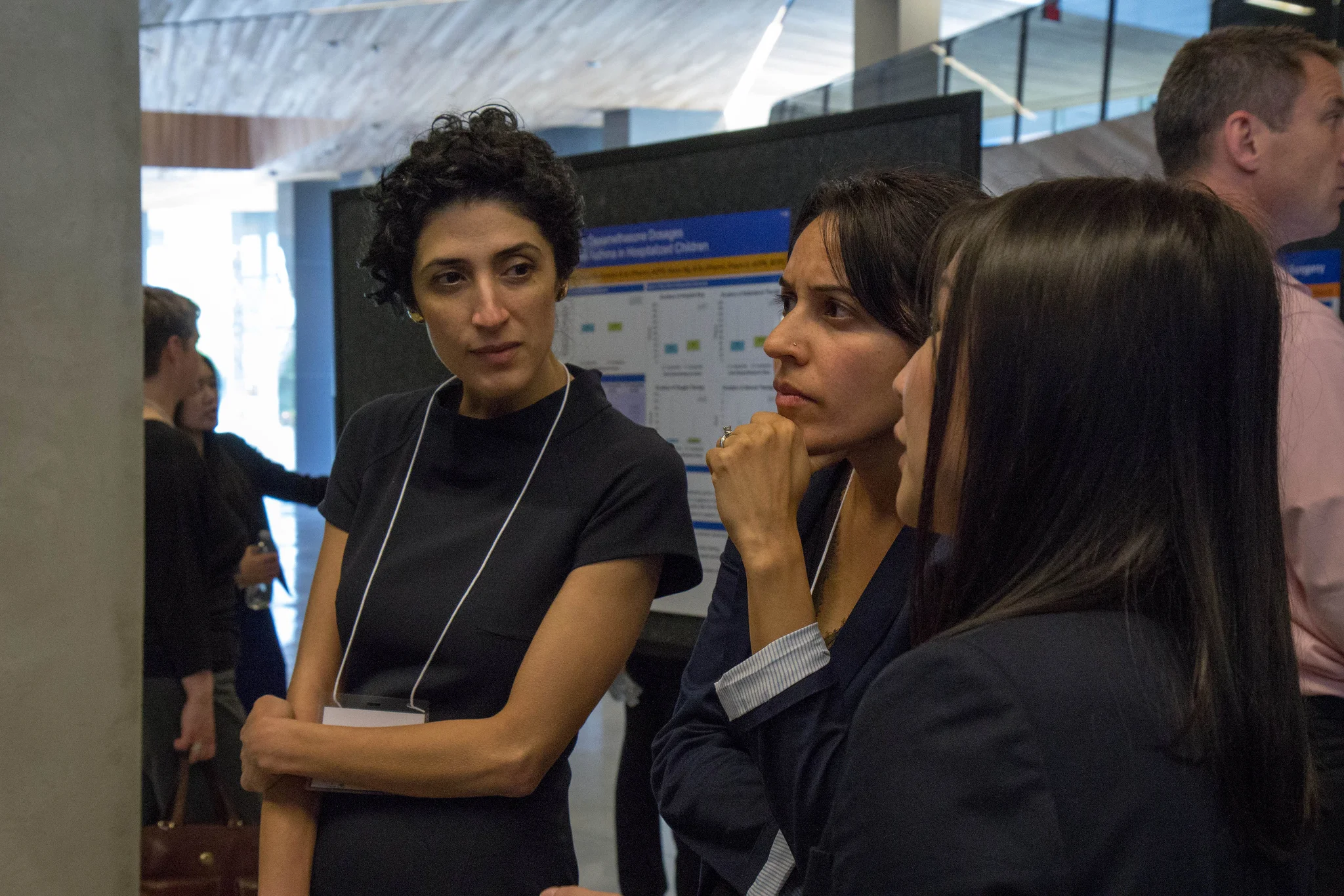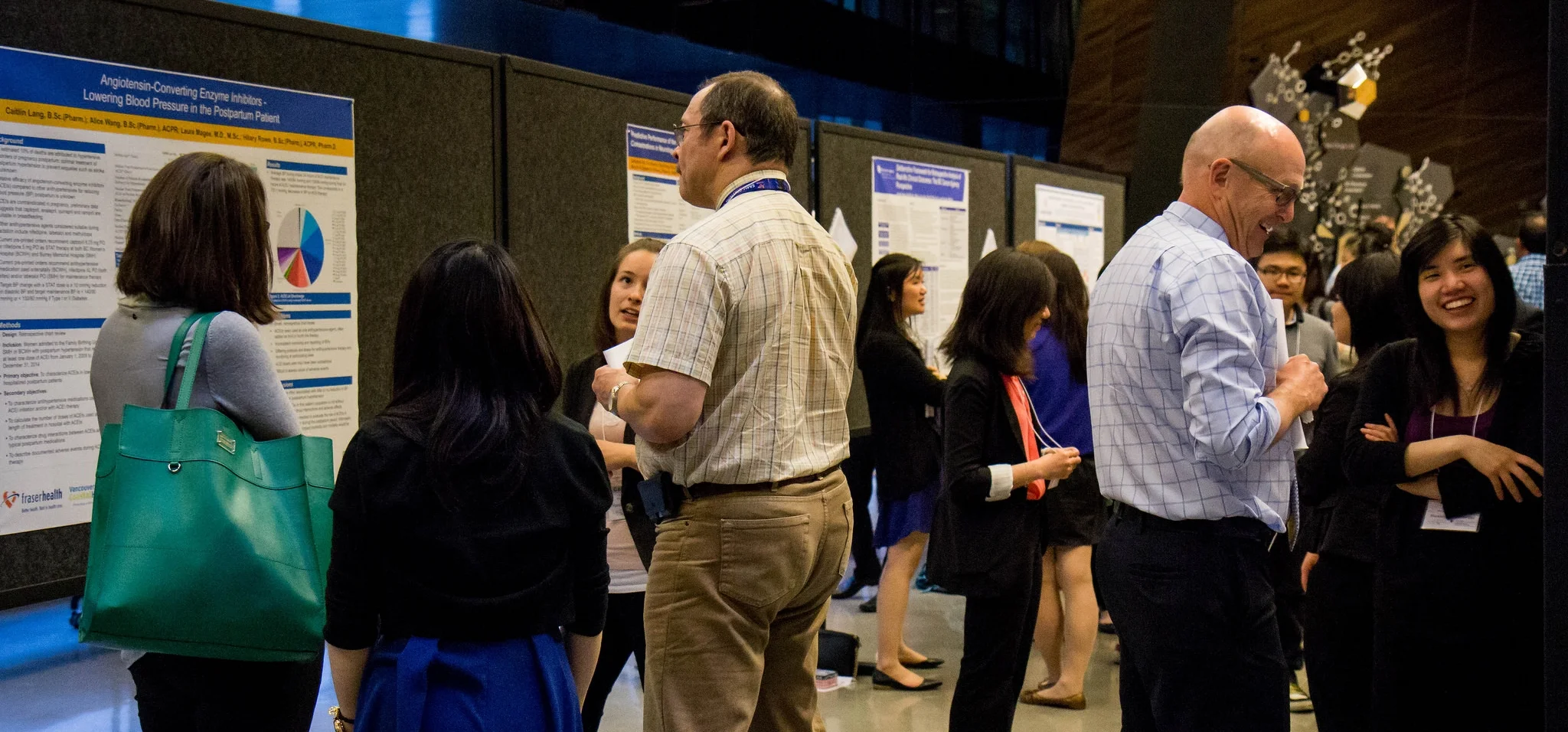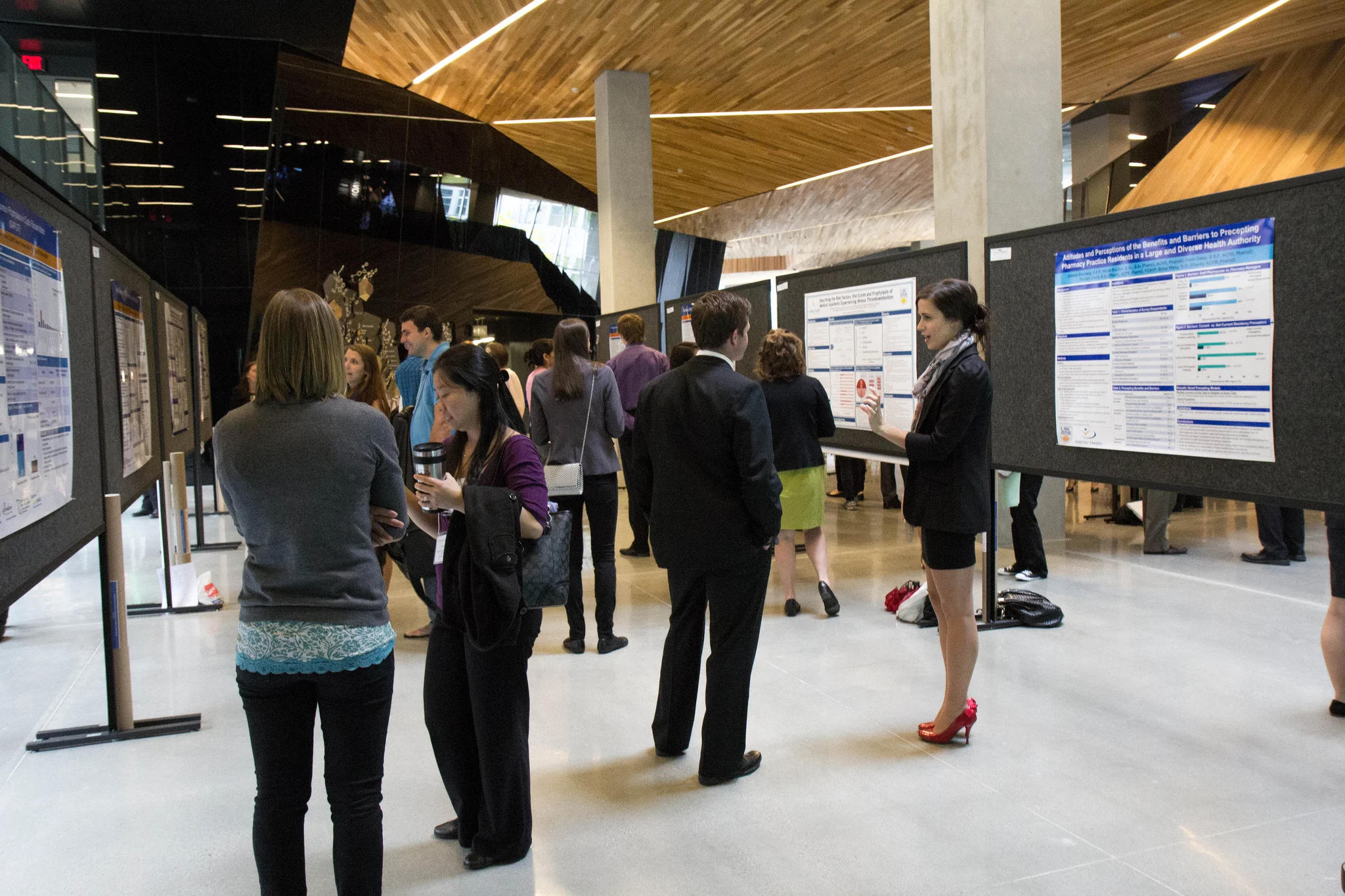
Research
As part of the LMPS Pharmacy Residency Program, residents have the unique opportunity to design and conduct a research project during their program year. This experience not only fulfills the requirements set by the Canadian Pharmacy Residency Board (CPRB), but also empowers residents to develop essential skills in project management, critical thinking, and evidence-based practice.
Residents are actively involved in every stage of the research process—from protocol development and data collection to analysis and interpretation—ensuring a comprehensive and hands-on learning experience.
Each spring, residents and their project preceptors from across British Columbia come together to present their work at the Annual Residency Research Night. This showcase celebrates innovation, collaboration, and the advancement of pharmacy practice, offering a valuable platform for knowledge exchange and professional networking.
Research Project Development Process
Every spring the residency program coordinators work with our LMPS preceptors to solicit and develop ideas for potential residency research projects.
These ideas are then translated into formal research project proposals which are then vetted by the program coordinators, site clinical coordinators and additional preceptors with research expertise. Projects proposals are reviewed for scope, feasibility, complexity and potential impact and feedback is provided to strengthen their proposals.
During orientation week, residents are provided with a list of available project proposals. Residents will have an opportunity to reach out to project preceptors to ask questions about the projects and then they rank the proposals in order of preference.
The residency coordinators then match the residents to projects.
Research Project Expectations and Timeline
Residents are provided with 8-9 weeks of dedicated project time within their residency schedule. The suggested timeline is below- this may vary depending on the resident’s project and overall schedule. Residents are required to create individual timelines with their project preceptors at the start of project week 1.
Weeks 1-2 (July-September): project literature search, protocol development and revisions, submission for ethical review (or exemption) and operational approval
Weeks 3-6 (September-Februrary/March): Data collection and analysis
Week 7 (March-April): poster development and revision
Week 8-9 (May-June): prepare manuscript
Residents will provide 2 project update presentations to the program coordinators in September and April. This is an opportunity to receive feedback on your project, ensure the project is on track and identify potential areas of support the resident may need for successful project completion and defense.
Important Deadlines for 2025-2026 Cohort:
Research Poster Due Date: May 8, 2026
Residency Research Night: May 2026 (final date, TBD)
Manuscript Due Date: June 12, 2026
Expectations for Residents
Be accountable and working on their project during all scheduled project hours
Communicate with the project preceptors in advance of all scheduled project weeks to discuss goals and objectives to be achieved each week and the preceptor’s availability
Take responsibility and accountability for all aspects of their project
Communicate challenges or aspects of the project that require additional support from the project preceptor
Be available and present at the worksite for all project meetings and other requirements, as set out by the preceptor
Stay on track with the timeline laid out at the start of the residency year to ensure the project will be completed by the required deadlines
Be respectful of your preceptor/project teams other required work duties and allow for adequate turn around time for them to review and provide feedback
Expectations for Preceptors
Provide guidance to the resident but allow the resident to be accountable and responsible for all aspects of the project
Provide respectful and actionable feedback early and often, as required to ensure the project stays on track
Communicate concerns about resident performance or logistical concerns with the program coordinators, if these issues cannot be resolved independently in a timely fashion
Respond to resident’s request for revisions/feedback in a timely fashion
Be available to provide or designate supervision and oversight for the resident during their scheduled projects weeks
Ethical and Operational Approval Process
All residents must complete the TCPS 2: Core 2022 (Course on Research Ethics) during their first project week
Residents and preceptors must also review and understand the difference between Research Requiring Ethical Review and Research Exempt From Ethical Review as outlined by the TCPS 2 in order to determine the required review processes for their project
It is recommended that residents have their protocol ready for submission for ethical approval or exemption by the end of their second project week.
All LMPS residency projects from all health authorities that are classified as research requiring ethical review must submit their protocols for harmonized ethical review through UBC rise and operational approval at their respective health authority.
Guidance notes for Year 1 BC Pharmacy Residents for submission to UBC Research Ethics
Residents must ‘tag’ their projects as pharmacy residency research projects within their applications
Once they have received ethical approval from UBC RISE, FH research projects must request a letter of authorization to conduct research through ROMEO
Processes for operational approval vary across health authorities and will be reviewed with residents and preceptors at their pod sites.
For project that are exempt from ethical review, processes such as obtaining operational approval, privacy review, survey review, data access agreement and a letter of exemption for ethical review vary between health authorities. These required processes will be reviewed with residents and project preceptors at their pod sites during their first project week.
If residents or project preceptors have questions about the required approvals process, please reach out to Karen Dahri for VCH and PHC, Kendra Sih for PHSA and Sarah Stabler for FH.
Useful References
Writing Center - PLOS scientific writing and publishing essentials
Canadian Journal of Hospital Pharmacy – Research Primer
Bond CM. The research jigsaw: how to get started. Can J Hosp Pharm. 2014; 67(1): 28-30.
Tully MP. Research: articulating questions, generating hypotheses, and choosing study designs. Can J Hosp Pharm. 2014; 67(1): 31-4.
Loewen P. Ethical issues in pharmacy practice research: an introductory guide. Can J Hosp Pharm. 2014; 67(2): 133-7.
Tsuyuki RT. Designing pharmacy practice research trials. Can J Hosp Pharm. 2014; 67(3): 226-9.
Bresee LC. An introduction to developing surveys for pharmacy practice research. Can J Hosp Pharm 2014; 67(4): 286-91.
Gamble JM. An introduction to the fundamentals of cohort and case-control studies. Can J Hosp Pharm. 2014; 67(5): 366-72.
Austin Z, Sutton J. Qualitative research: getting started. Can J Hosp Pharm. 2014; 67(6): 436-40.
Houle S. An introduction to the fundamentals of randomized controlled trials in pharmacy research. Can J Hosp Pharm. 2015; 68(1): 28-32.
Charrois TL. Systematic reviews: What do you need to know to get started? Can J Hosp Pharm. 2015; 68(2): 144-8.
Sutton J, Austin Z. Qualitative research: data collection, analysis, and management. Can J Hosp Pharm. 2015; 68(3): 226-31.
Cadarette SM, Wong L. An introduction to health care administrative data. Can J Hosp Pharm. 2015; 68(3): 232-7.
Simpson SH. Creating a data analysis plan: what to consider when choosing statistics for a study. Can J Hosp Pharm. 2015; 68(4): 311-7.


